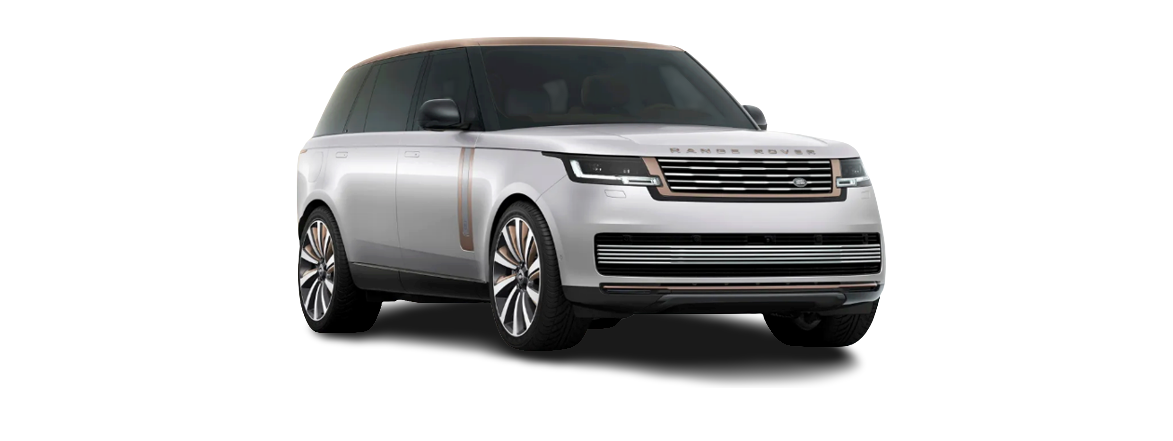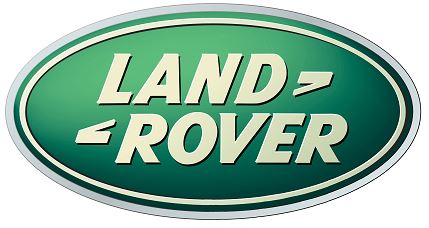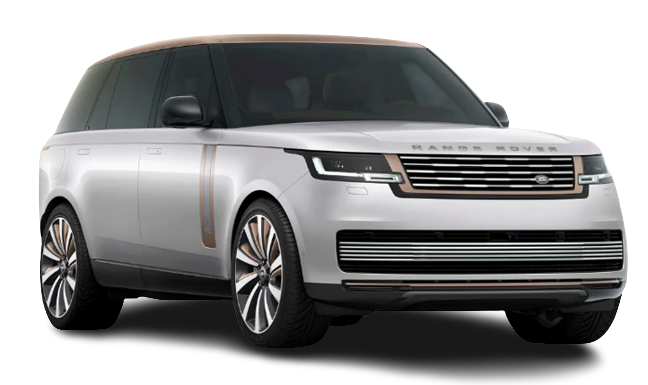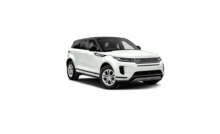2023 Land Rover NEW RANGE ROVER TECHNICAL SPECIFICATIONS Owner Manual




2023 Land Rover NEW RANGE ROVER TECHNICAL SPECIFICATIONS


TECHNICAL SPECIFICATIONS
Some technical specification information in the Owner’s Handbook is not available at the time of print, or is subject to updates after printing. Please visit the online Owner’s Handbook at: www.ownerinfo.landrover.com, or contact a retailer/authorized repairer, for the latest data.
ENGINE SPECIFICATIONS
| Engine variant | Number of cylinders | Displacement (cc) |
|---|---|---|
| 3.0L gasoline. | 6 | 2 995 |
| 4.4L gasoline. | 8 | 4 395 |
For further information, contact a retailer/authorized repairer and quote the Vehicle Identification Number (VIN). See LABEL LOCATIONS.
LUBRICANTS AND FLUIDS
| Part | Variant | Specification |
|---|---|---|
| Engine oil. | 3.0L gasoline. | SAE 0W-20 meeting Jaguar Land Rover specification STJLR.03.5006. |
| 4.4L gasoline. | SAE 0W-30 meeting Jaguar Land Rover specification STJLR.03.5007. | |
| Brake fluid. | All vehicles. | It is recommended to use Land Rover brake fluid. If unavailable, non-petroleum based brake fluid meeting specification DOT4 ISO 4925 Class 6 may be used. |
| Washer fluid. | All vehicles. | Screen wash with frost protection, diluted with clean water, as specified on the bottle. |
| Engine coolant fluid. | All vehicles. | Mixture of 50% water and 50% antifreeze meeting Jaguar Land Rover specification STJLR.651.5003. |
| Air Conditioning (A/C) refrigerant. | All vehicles. | R1234YF. |
| A/C compressor oil. | All vehicles. | PAG oil. |
If in doubt about the required specification of a lubricant or fluid, seek advice from a retailer/authorized repairer.
Castrol EDGE Professional exclusively recommended by Land Rover.
CAPACITIES
| Item | Variant | Capacity – pints (L) |
|---|---|---|
| Fuel tank (usable). | Plug-in Hybrid Electric Vehicles (PHEV) | 18.9 gallons (71.5) |
| Gasoline vehicles except PHEV. | 23.8 gallons (90) | |
| Engine oil refill and filter change. | 3.0L gasoline. | 7.9 US QT (9.4) |
| 4.4L gasoline. | 11.6 US QT (11.0) | |
| Washer reservoir. | All vehicles except PHEV. | 13.7 (6.5) |
| PHEV. | 14.4 (6.8) | |
| Air conditioning refrigerant. | 3 zone. | 1.76 lb (800 g) |
| 4 zone. | 2.1 lb (950 g) | |
| Air conditioning compressor oil. | 3 zone. | 3.38 oz (100 ml) |
| 4 zone. | 4.4 oz (130 ml) |
The quoted capacities are approximate and provided as a guide only. All levels must be checked using the level marks or information displayed on the vehicle, as applicable.
WEIGHTS
| Variant | Curb weight lbs (kg) | Gross Vehicle Weight (GVW)* lbs (kg) | Gross Train Weight (GTW)** lbs (kg) |
|---|---|---|---|
| Standard wheelbase vehicles | |||
| 3.0L gasoline. | 5 240 (2 379) | 7 385 (3 350) | 15 100 (6 850) |
| 4.4L gasoline. | 5 530 (2 510) | 7 385 (3 350) | 15 585 (7 070) |
| 3.0L gasoline – Plug-in Hybrid Electric Vehicles (PHEV) | 5 940 (2 695) | 7 605 (3 450) | 13 115 (5 950) |
| SV Standard wheelbase vehicles | |||
| 4.4L gasoline. | 5 530 (2 510) | 7 385 (3 350) | 15 585 (7 070) |
| Long wheelbase (LWB) vehicles – 5 seats | |||
| 3.0L gasoline. | 5 385 (2 444) | 7 385 (3 350) | 15 100 (6 850) |
| 4.4L gasoline. | 5 620 (2 551) | 7 385 (3 350) | 15 585 (7 070) |
| SV LWB vehicles – 4 seats | |||
| 4.4L gasoline. | 6 175 (2 728) | 7 315 (3 320) | 15 760 (7 150) |
| SV LWB vehicles – 5 seats | |||
| 4.4L gasoline. | 5 620 (2 551) | 7 385 (3 350) | 15 585 (7 070) |
| LWB – 7 seats | |||
| 3.0L gasoline. | 5 600 (2 541) | 7 405 (3 360) | 15 120 (6 860) |
| 4.4L gasoline. | 5 840 (2 650) | 7 560 (3 430) | 15 760 (7 150) |
* The maximum permissible weight of the vehicle, including passengers and load.
** The maximum permissible weight of the vehicle and braked trailer, including their respective loads.
| Variant | Maximum front axle load* lbs (kg) | Maximum rear axle load* lbs (kg) | Maximum roof load** lbs (kg) – Dynamic |
|---|---|---|---|
| PHEV. | 3 570 (1 620) | 4 475 (2 030) | 220 (100) |
| SV LWB – 4 seats | 3 505 (1 590) | 4 055 (1 840) | |
| All vehicles except PHEV. | 3 505 (1 590) | 4 320 (1 960) |
* The front and rear axle maximum loads cannot be reached simultaneously, as this will exceed the GVW limit.
** This is the permitted roof load, including the weight of the roof bars.
The maximum roof load for a static vehicle is 275 lbs (125 kg).
DIMENSIONS
| Item | Description | Variant | Inches (mm) | Degrees |
|---|---|---|---|---|
| A | Width (including mirrors) | All vehicles | 87.0 (2 209) | – |
| Body width | All vehicles | 86.7 (2 003) | – | |
| B | Height | All vehicles | 73.6 (1 870) | – |
| C | Approach angle | All vehicles except SV | – | 26.1 |
| SV | – | 25.1 | ||
| D | Ramp breakover angle | Standard wheelbase – SV | – | 19.5 |
| Standard wheelbase – Plug-in Hybrid Electric Vehicles (PHEV) | – | 19.0 | ||
| Standard wheelbase – all other vehicles | – | 21.4 | ||
| Long wheelbase (LWB) – PHEV | – | 17.8 | ||
| LWB – except PHEV | – | 20.1 | ||
| E | Wheelbase | Standard wheelbase | 118.0 (2 997) | – |
| LWB | 125.9 (3 197) | – | ||
| F | Length (including license plate plinth) | Standard wheelbase | 199.4 (5 064) | – |
| LWB | 207.2 (5 264) | – | ||
| G | Track – front | All vehicles | 67.0 (1 702) | – |
| – | Track – rear | All vehicles | 67.0 (1 704) | – |
| H | Departure angle | All vehicles | – | 24.5 |
| – | Wading depth (off road height)* | All vehicles | 35.4 (900) | – |
| – | Minimum ground clearance – standard height | All vehicles except PHEV | 8.62 (219) | – |
| PHEV | 8.23 (209) | – | ||
| Minimum ground clearance – off road height | Standard wheelbase – except PHEV | 11.6 (295) | – | |
| LWB – except PHEV | 11.6 (294) | – | ||
| PHEV | 11.2 (284) | – | ||
| – | Turning circle (wall to wall) | Standard wheelbase | 37.3 ft (11.37 m) | – |
| LWB | 39.2 ft (11.96 m) | – |
*Maximum wading speed is 4 mph (7 km/h).
SMART KEY TRANSMITTER LOCATIONS
Any person fitted with an implanted medical device should be kept at a distance of at least 9 in (22 cm) away from any transmitter mounted in the vehicle. This is to avoid any possibility of interference between the system and the device.
- Front bumper transmitter.
- Cabin front transmitter.
- Satellite transceiver.
- Door transmitters.
- Keyless vehicle module.
- Radio transceiver.
- Satellite transceiver.
- Rear bumper transmitter.
RADIOFREQUENCY SPECTRUM REGULATION STATEMENTS
This device complies with Part 15 of the FCC rules. Operation is subject to the following two conditions:
(1) This device may not cause harmful interference, and
(2) this device must accept any interference received, including interference that may cause undesired operation.
This device complies with Industry Canada Standard IC – RSS-210: Operation is subject to the following two conditions:
(1) this device may not cause interference, and
(2) this device must accept any interference, including interference that may cause undesired operation of the device.
The key system transmitter radio frequency approval numbers for the USA and Canada are shown below:
| USA FCC ID: | KOBJBG18A |
| KOBJTF18A | |
| KOBJXF18A | |
| KOBJXU18A | |
| Canada IC: | KOBJBG18A |
| KOBJTF18A | |
| KOBJXF18A | |
| KOBJXU18A |
The manufacturer is not responsible for any radio interference or TV interference caused by unauthorized modifications to this equipment. Changes or modifications not expressly approved by the party responsible for compliance could void the user’s authority to operate the equipment.
The Smart key may suffer interference from other legal users of this radio frequency band, such as radio amateurs, medical equipment, remote controls or alarm systems. To lock or unlock the vehicle in such a situation, either use a key or operate the key transmitter as close to the security antenna as possible.
Recent Posts
VW Jetta Engine Fuse Box Diagram
Access the comprehensive 2010-2018 VW Jetta Passenger Fuse Box Diagram to troubleshoot electrical issues effectively.…
VW Jetta Passenger Fuse Box Diagram
Explore the comprehensive VW Jetta Passenger Fuse Box Diagram to troubleshoot electrical issues effectively. Understand…
2023 Ford F-150 Lightning Fuse Box Diagram
Under Hood Fuse Box Location Remove the front luggage compartment cover. Under Hood Fuse Box…
2022 Kawasaki NINJA H2 SX SE Brake Lever Adjuster Owner’s Manual
2022 Kawasaki NINJA H2 SX SE Brake Lever Adjuster Owner's Manual NOTICE Only adjust the front…
2023 Land Rover Range Rover Evoque Exiting The Vehicle Owners Manual
2023 Land Rover Range Rover Evoque Exiting The Vehicle SINGLE LOCKING WARNING Before exiting the…
2023 Land Rover Range Rover Evoque Front Seats Owners Manual
2023 Land Rover Range Rover Evoque Front Seats FRONT SEAT SAFETY Make sure to read…
